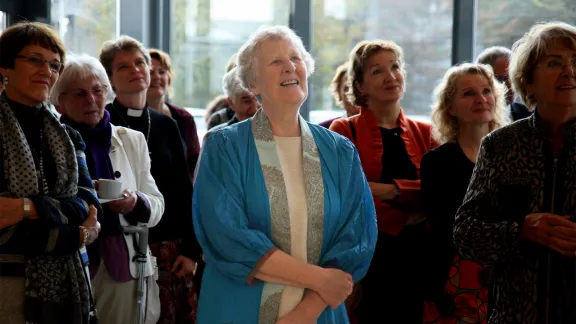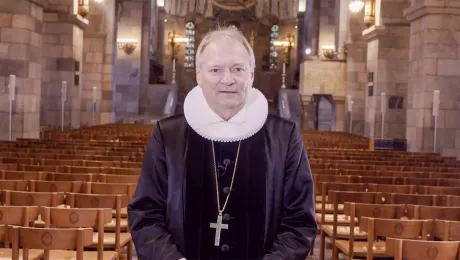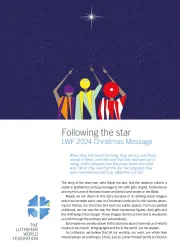
Voices from the Communion Rev. Auður Eir Vilhjálmsdóttir the first woman ordained in the Evangelical Lutheran Church of Iceland preaches to the Womanâs Church. Photo: Kvennakirkjan
Voices from the Communion: Rev. Auður Eir Vilhjálmsdóttir the first woman ordained to ministry in Iceland
(LWI) - Women from around the Lutheran World Federation (LWF) communion of churches often mention Rev. Auður Eir Vilhjálmsdóttir, the first woman ordained as a pastor in The Evangelical Lutheran Church of Iceland, as their inspiration and role model of female leadership within the church.
Earning her theology degree in 1962 and ordained in 1974, Rev. Auður Eir began her ministry at a small fishing village congregation and eventually joined other women to establish Kvennakirkjan (Women’s Church) to address the challenges all women faced in their faith communities and to rethink how the church talked about God, gender and equality.
In this Voices from the Communion interview, Rev. Auður Eir gives us glimpse of the joys she experienced, the advancements of the church and the future of the Women’s Church and gender justice.
Tell us about your religious training as a child. What was your home like?
My home was a fun place to be and was always full of people. My dad said that we were not raised as such, but rather we just took part in the things that were happening in the family and community. I worked at KFUK (the Icelandic YWCA) from an early age, and it impacted me deeply.
My theology studies were a natural continuation of my participation in the Christian community. I felt that it was a natural progression that I become a minister after my work in KFUK. It never occurred to me that others would not see that becoming a minister would be the “most likely” next step for me as a woman.
Did you have a supportive family?
I enrolled in the Department of Theology at the University of Iceland soon after my matriculation exams. At the time, I was also a newlywed. Some people advised me to enroll instead in the homemaker school. But everyone in my household felt that theology was a better fit for me. I remember my grandmother said, “Don’t go to homemaker school, study theology!” My husband and my little daughters were also always very supportive of my studies.
What is the most memorable moment in your ministry?
All the moments I have had with the people in my congregations are memorable. I loved these people. I remember when I came to meet the director of the congregation I was eventually ordained to serve.
At the time, pastors in Iceland were chosen through a general election in the congregation. I had sought to be ordained many times before at different congregations but was not elected by the congregation to serve them, but then I went to this little remote village congregation of fishermen, and I was received with open arms. Initially, they thought my husband had come to serve as pastor. I stood behind him and he quickly corrected them and stepped aside and introduced me as the candidate. They accepted me and I was finally ordained. It was my first congregation, and I became the first woman ordained in the Evangelical Lutheran Church of Iceland. On the other hand, I remember fondly the last congregation I served and how they thanked me for our time together when it was time to say goodbye.
Was the church on the cutting edge of feminism in Iceland when you were ordained?
In 1974 there was a lot of feminism in society in general and a lot of advocacy activities. However, changes did not happen as fast within the church, and this was evident based on the reactions I received from people when I applied to be ordained. One woman told me that she couldn’t imagine a woman officiating at her husband’s funeral. Another said, ‘I’ve never seen a woman baptize a child.’ And the third: ‘Why aren’t you at home if you have four daughters?’
Is the National Church still attracting young women to ordained ministry?
Yes, many young women study theology and are ordained to serve as ministers, today. In fact, there are so many motivated women who are making lasting changes in the church. I am confident that these women will continue positive change and influence the direction and daily activities of the church.
Well, our bishop is a woman and there are also many female deans. The chairperson of the Association of Ministers is a woman and three women are on the faculty of the Department of Theology at the University of Iceland. That would have been unthinkable 40 years ago. Many of these remarkable women, as well as the bishop, are members of the Women’s Church.
Kvennakirkjan (Women’s Church) is still operating. In what direction would the Women’s Church like to grow?
The Women’s Church proposes a theology that we believe is necessary precisely now, and to continue to offer women a community of faith, prayer, Bible study, peace and joy. We have published many books about feminist theology. At the urging of The Women’s Church, the National Church of Iceland released the latest version of the New Testament using inclusive gender language.
Has the Women´s Church expanded its focus to address the unique concerns of female clergy from diverse ethnicities?
It has only been the last two decades that Iceland became a multi-cultural society. Although the church has recently approved a comprehensive immigration and refugee policy that vows to improve the church’s services to people of foreign backgrounds, there still is not a systematic collaboration of clergy from diverse ethnicities.
Historically, there have been women of diverse national backgrounds within the Women’s Church and all the women of the Women’s Church have always sought to inform themselves on the issues of diversity by inviting men and women from various fields to broaden its horizons.
What does it mean for your church, your work, you to be a part of the communion of churches?
We have written new liturgies and have been inspired by the LWF Gender Justice Policy and have followed that example.
LWF/A.Gray
Video: Rev. Auður Eir Vilhjálmsdóttir
The Lutheran World Federation is a global body that shares the work and love of Christ in the world. In this series, we profile church leaders and staff as they discuss topical issues and set out ideas for building peace and justice in the world, ensuring the churches and communion grow in witness and strength.


